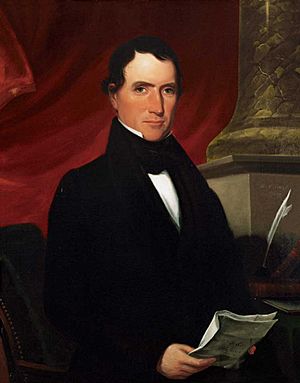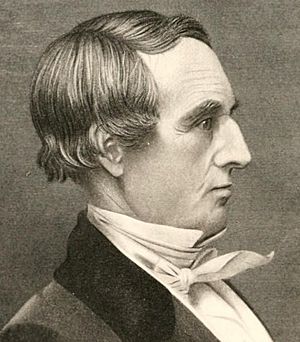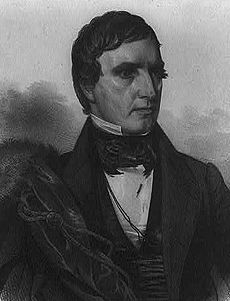William R. King facts for kids
Quick facts for kids
William R. King
|
|
|---|---|

Portrait by George Cooke, 1839
|
|
| 13th Vice President of the United States | |
| In office March 4, 1853 – April 18, 1853 |
|
| President | Franklin Pierce |
| Preceded by | Millard Fillmore |
| Succeeded by | John C. Breckinridge |
| United States Senator from Alabama |
|
| In office July 1, 1848 – December 20, 1852 |
|
| Preceded by | Arthur P. Bagby |
| Succeeded by | Benjamin Fitzpatrick |
| In office December 14, 1819 – April 15, 1844 |
|
| Preceded by | None (Statehood) |
| Succeeded by | Dixon Hall Lewis |
| President pro tempore of the United States Senate | |
| In office May 6, 1850 – December 20, 1852 |
|
| Preceded by | David Rice Atchison |
| Succeeded by | David Rice Atchison |
| In office July 1, 1836 – March 4, 1841 |
|
| Preceded by | John Tyler |
| Succeeded by | Samuel L. Southard |
| United States Minister to France | |
| In office April 9, 1844 – September 15, 1846 |
|
| President | John Tyler James K. Polk |
| Preceded by | Lewis Cass |
| Succeeded by | Richard Rush |
| Member of the U.S. House of Representatives from North Carolina's 5th district |
|
| In office March 4, 1811 – November 4, 1816 |
|
| Preceded by | Thomas Kenan |
| Succeeded by | Charles Hooks |
| Member of the North Carolina House of Commons |
|
| In office 1807–1809 |
|
| Personal details | |
| Born |
William Rufus DeVane King
April 7, 1786 Sampson County, North Carolina, U.S. |
| Died | April 18, 1853 (aged 67) Selma, Alabama, U.S. |
| Resting place | Old Live Oak Cemetery |
| Political party | Democratic |
| Other political affiliations |
Democratic-Republican (before 1828) |
| Alma mater | University of North Carolina at Chapel Hill |
| Signature | |
William Rufus DeVane King (born April 7, 1786 – died April 18, 1853) was an American politician and diplomat. He served as the 13th Vice President of the United States. His term was very short, from March 4, 1853, until his death in April 1853.
Before becoming Vice President, he was a U.S. representative for North Carolina. He also served as a senator for Alabama. King was also a diplomat in France under President James K. Polk.
King was a member of the Democratic Party. He believed in keeping the United States united, which was important before the American Civil War. He was seen as a moderate on issues like slavery and expanding the country westward. He helped create the Compromise of 1850, which tried to settle disputes over slavery.
He is the only U.S. Vice President to take his oath of office in another country. He was sworn in in Cuba because he was very sick. He died of tuberculosis just 45 days later. This made him the third Vice President to die while in office. William R. King was the only U.S. Vice President from Alabama.
Contents
Early Life and Education
William Rufus DeVane King was born in Sampson County, North Carolina. His parents were William King and Margaret DeVane. His family was large and had many connections.
He graduated from the University of North Carolina at Chapel Hill in 1803. He was part of a student group called the Philanthropic Society. After college, he studied law with Judge William Duffy. He became a lawyer in 1806 and started his practice in Clinton. King was also a member of a group called the Freemasons.
Political Career
King started his political career in North Carolina. He was elected to the North Carolina House of Commons and served from 1807 to 1809. In 1810, he became the city lawyer for Wilmington, North Carolina.
He was elected to the U.S. Congress three times. He served from March 4, 1811, until November 4, 1816. He resigned to become a diplomat with William Pinkney. Pinkney was the U.S. representative to Russia and on a special mission to Naples. King was only 24 years old when he first became a congressman.
When he returned to the U.S. in 1818, King moved west to the Deep South. He bought land near what is now Selma on the Alabama River. He built a large cotton farm called "Chestnut Hill." This farm used the labor of enslaved people. King and his family owned many enslaved people, sometimes as many as 500.
William Rufus King helped create the government for the new state of Alabama. When Alabama became the 22nd state in 1819, he was elected to the United States Senate. He was a member of the Democratic-Republican Party.
King supported Andrew Jackson, a popular political leader. King was re-elected to the Senate in 1822, 1828, 1834, and 1841. He served from December 14, 1819, until he resigned on April 15, 1844. During this time, he was considered for Vice President in the 1824 election. He also served as the President pro tempore of the United States Senate several times. This role means he led the Senate when the Vice President was not there. King also led the Senate's committees on Public Lands and Commerce.
He was appointed as the U.S. representative to France and served from 1844 to 1846. After returning, King went back to the Senate. He was appointed and then elected to fill a vacant seat. He held this seat from July 1, 1848, until December 20, 1852. He resigned because of poor health and because he had been elected Vice President.
During the time leading up to the Compromise of 1850, King supported rules that limited debate on anti-slavery petitions. He also opposed ending slavery in Washington, D.C.. King believed the Constitution protected slavery in Southern states and federal territories. He opposed both those who wanted to end slavery and those who wanted Southern states to leave the Union.
On July 11, 1850, after President Zachary Taylor died, King was appointed Senate President pro tempore. Because Millard Fillmore became President, the Vice President's office was empty. This made King next in line to become President at that time. He also led the Senate's committees on Foreign Relations and Pensions.
Vice Presidency and Death
In 1852, the 1852 Democratic National Convention chose Franklin Pierce for president and William R. King for vice president.
Pierce and King won the election against Winfield Scott and William Alexander Graham. King was very sick with tuberculosis and had gone to Cuba to try and get better. Because of his illness, he could not be in Washington, D.C., to take his oath of office on March 4, 1853.
Congress passed a special law on March 2, allowing him to take the oath outside the U.S. He was sworn in on March 24, 1853, near Matanzas, Cuba. The U.S. consul to Cuba, William L. Sharkey, performed the ceremony. King is the only U.S. Vice President to take the oath of office in a foreign country.
Soon after, King traveled back to his home at Chestnut Hill. He died just two days after arriving, on April 18, 1853, at age 67. He was buried on his plantation. Later, his body was moved to Selma's Old Live Oak Cemetery. King never performed any duties as Vice President.
After King's death, the office of Vice President remained empty. It was filled when John C. Breckinridge became Vice President with President James Buchanan in March 1857.
Legacy and Honors

- In 1852, the Oregon Territory named King County after William R. King. This county is now part of Washington State. In 1985, King County decided to also honor Martin Luther King Jr. (who was not related to William R. King) with the county's name. This change became official in 2005.
- The King Residence Quadrangle at the University of North Carolina at Chapel Hill, where he went to college, is named for him.
- A portrait of King from 1830 is kept at New East Hall in the Philanthropic Chambers. This is where the debating society he joined in college met.
- King helped found the city of Selma, Alabama. He named it after a poem called "The Songs of Selma." After he died, city officials and some of his family wanted to move his body to Selma. In 1882, his remains were moved to the city's Live Oak Cemetery. A white marble tomb was built there by the city.
Images for kids
See also
 In Spanish: William R. King para niños
In Spanish: William R. King para niños




